Technology is disrupting long-standing business models and every sector is feeling its transformative impact, from manufacturing to telecoms to financial services. The chief information officer (CIO) occupies a unique position at the centre of this transformation, leading one of the most critical functions in the organisation. IT lies at the heart of an integrated future, creating the platform on which manufacturing, operations, supply chain, sales, marketing, finance and HR can work seamlessly together.
Spencer Stuart has examined the profile and background of the chief information officers (CIOs) of the DAX 30 companies in December 2018, the cut-off date for our research. The highlights of our analysis follow, as well as some predictions that draw upon our work advising companies on the evolution of their technology leadership.
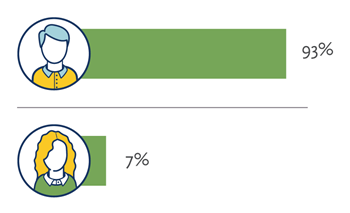 LACK OF GENDER DIVERSITY
LACK OF GENDER DIVERSITY
Out of 28 CIOs* in our sample, only two are women. Only Beiersdorf and Covestro have female CIOs. Developing a diverse pipeline of IT talent means actively removing obstacles that prevent women from entering the function and progressing in their careers. We believe that companies with more diverse IT teams will provide better services and enjoy competitive advantage.
* Two DAX companies did not have a CIO in place at our cut-off date in December 2018.
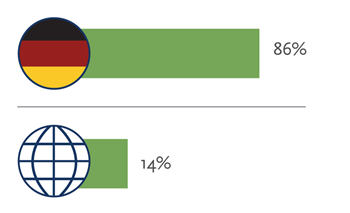 MAJORITY OF CIOs ARE GERMAN NATIONALS
MAJORITY OF CIOs ARE GERMAN NATIONALS
86% of CIOs in the DAX 30 are German nationals. Four companies have a non-German CIO: Covestro (US), E.ON (UK), Linde (India) and Munich Re (UK). It is important for German companies to cast a wide net, both internally and externally, to find the best possible technology leadership talent.
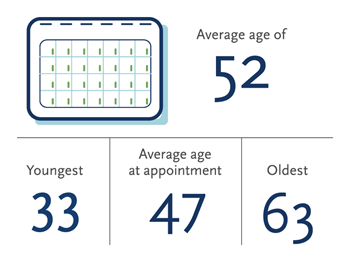 HIGH LEVEL OF SENIORITY
HIGH LEVEL OF SENIORITY
The average age of CIOs is 52 years. The youngest CIO is 33 years old and works for SAP; the oldest DAX CIO is 63 and works for Beiersdorf. The average age of CIOs at the time of appointment was just over 47 years. 64% of CIOs were under the age of 50 when appointed.
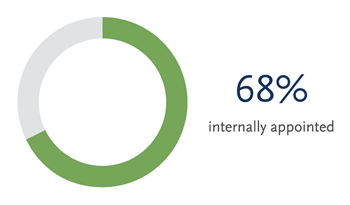 INTERNAL VS EXTERNAL APPOINTMENTS
INTERNAL VS EXTERNAL APPOINTMENTS
Over two-thirds (68%) of DAX 30 CIOs were internal appointments. 21% of DAX 30 CIOs have worked for the same company their whole career. DAX 30 companies tend to have large functional teams and actively create leadership development opportunities for high-potential executives, thus prioritising internal leadership succession.
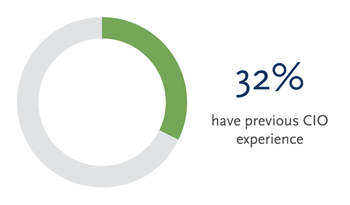 EXPERIENCE IN THE TOP ROLE
EXPERIENCE IN THE TOP ROLE
Just under one-third (32%) of DAX 30 CIOs had been a CIO prior to their current appointment. Interestingly, two of the CIOs who were external appointments had not previously held a CIO role.
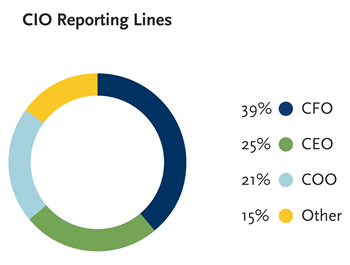 REPORTING LINES
REPORTING LINES
Only 25% of CIOs report directly to the CEO, a further indication that the technology function may not always have a ‘seat at the table’ in the highest-level discussions and decision-making.
Only one CIO is a member of the management board. While this suggests that the company views technology as mission-critical, it is perhaps surprising in this era of digital transformation that more companies have not elevated their CIO to the management board.
 TENURE
TENURE
The average tenure for DAX 30 CIOs is just over five years. Forty-six per cent of CIOs have been in their role for less than three years and 18% have been in the role for eight years or more. The most experienced CIO has occupied the position for over 15 years.
It is interesting to note that CIOs with the shortest average tenure are found in technology companies (3.2 years on average), followed by financial services (5.9 years). The longest average tenure appears among CIOs in the chemicals and pharma sectors (7.2 years).
PRESENCE OF A CHIEF DIGITAL OFFICER
Despite the digital transformation taking place across all sectors in Germany, it is notable that only 32% of DAX 30 companies have a chief digital officer (CDO). Most CDOs were appointed to take charge of digital strategy and build bridges to enable different parts of the organization to work effectively together during the transformation process. Too often, CDOs were given too few resources or too little support from top management and the value of the role was called into question. It is likely that the CDO role will become obsolete over time, and the trend is for fewer companies to hiring someone into the CDO role.
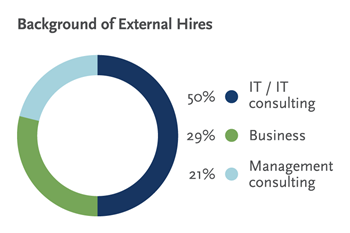 THE ROUTE TO THE TOP
THE ROUTE TO THE TOP
50% of DAX 30 CIOs have a primary background in IT or IT consulting. By contrast, 29% of CIOs have a business or finance background, indicating that, for some companies at least, a technology background is not a prerequisite for the top technology role. 21% of CIOs have a background in management consulting.
EDUCATION
Nearly 70% of DAX 30 CIOs have some form of technical degree; over 52% have a business degree, either on its own or in combination with a technical degree. One-third of DAX 30 CIOs have a PhD.
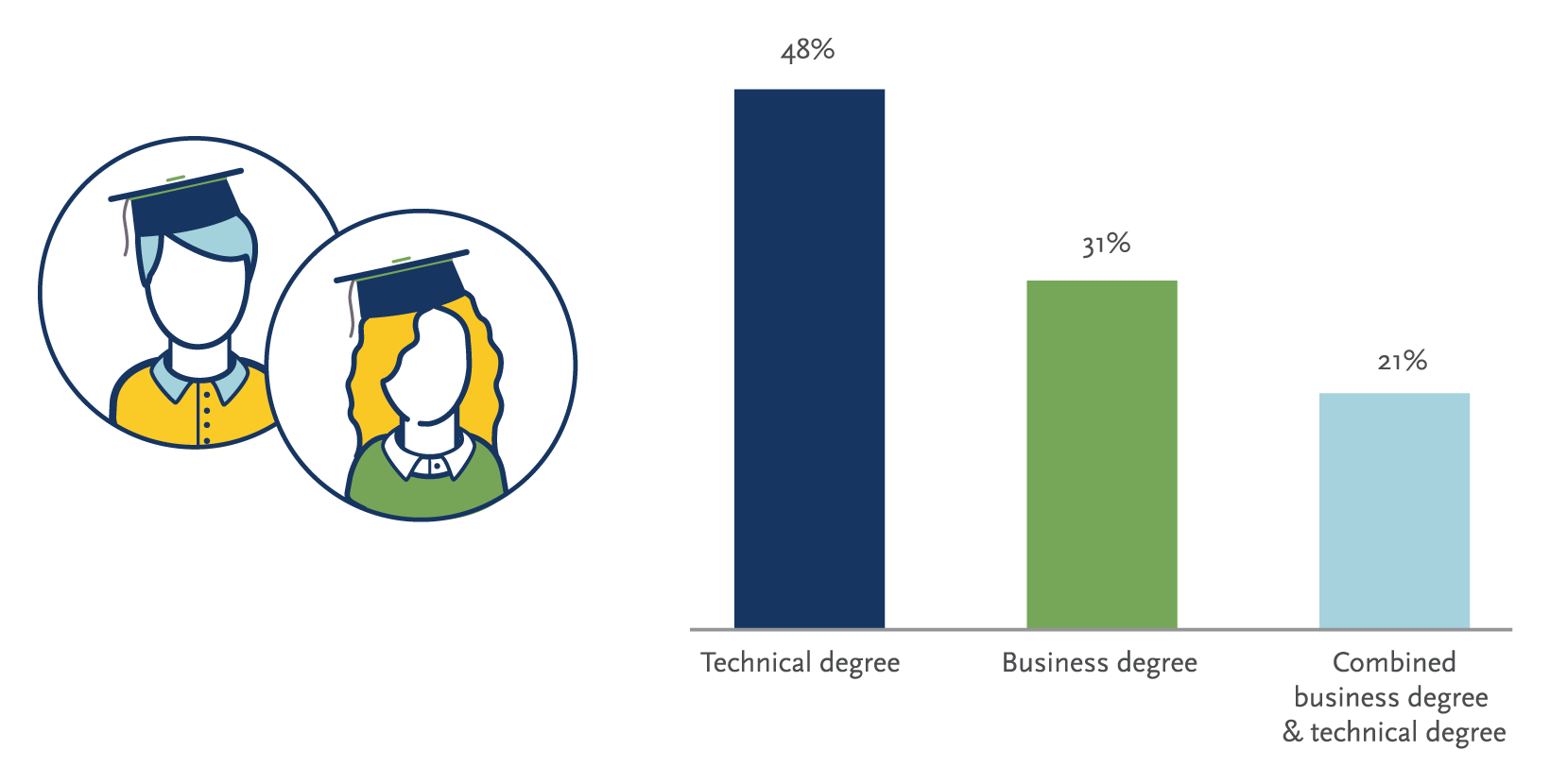
The Spencer Stuart Perspective
THE IDEAL CIO PROFILE
As DAX companies prepare the next generation of CIOs they will need to balance their current needs with a new set of competencies that will enable them to thrive in the future.
While a high level of technical ability is normally a given for a CIO, companies are looking beyond the purely technical for a blend of strategic and operational capabilities, coupled with an aptitude for leading and developing people. What differentiates the CIOs who have the greatest impact is the soft skills they bring to their role.
While the list of capabilities expected of today’s CIOs are on the rise, we have identified three particular ‘soft skills’ that we believe every CIO should possess.
1. Communication
The ability to break down a strategic story into bitesized pieces that anyone can understand is essential for a CIO, whether the audience is the board of directors, a group of IT leaders or the senior executive team.
2. Influence and collaboration
C-suite executives are increasingly finding that the most effective way to manage is through influence rather than control. CIOs are in a unique position when it comes to leading cross-functional collaboration and, while they’re at it, increasing their influence in the business.
3. A learning mindset
Increasingly, leaders are defined by their capacity to learn, adapt and innovate at speed. Today’s business environment is full of uncertainty and ambiguity and CIOs have to deliver on projects that are not always clearly defined. Part of the CIO role is to instil a learning mindset throughout the entire IT function.
It could be argued that the next generation of CIOs will be leading the most critical function in the organisation. IT will lie at the heart of an integrated future in which sales, marketing, finance, HR and operations are obliged to work far more closely together.
In future, we believe the role will require a combination of technical and general management expertise, with the CIO acting as business advisor, not simply the leader of a support function.
What is certain is that the next generation of CIOs are likely to bring a wider range of disciplines and experiences to bear on the role, combining technology know-how with project leadership capabilities and strong people management skills, founded on a passion for delivering business value.
Technology is disrupting long-standing business models and every sector is feeling its transformative impact. CIOs occupy a unique position at the centre of this transformation, facing enormous challenges but with a once-in-a-lifetime opportunity to redefine not only their leadership role but also the nature and purpose of the technology function they oversee.
For more information, read "The CIO and digital transformation".